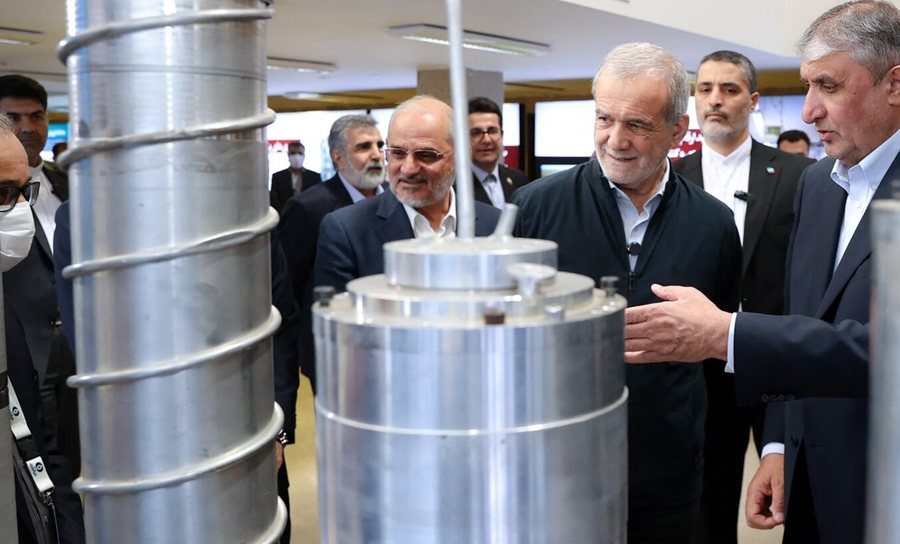
United States President Donald Trump surprised almost everyone when he announced in the Oval Office - during a meeting with Israeli Prime Minister Benjamin Netanyahu - that direct, high-level talks on Iran's nuclear program have been scheduled for April 12 in Oman.
It is not clear whether Iran wanted to keep this a secret, but Foreign Minister Abbas Araqchi felt it was very necessary to say at midnight, Tehran time, that the talks would be indirect, the opposite of what Trump said, REL writes .
Regardless of the format, both sides have presented this as an exploratory meeting to understand whether talks can take place, A2 reports.
But beneath the headlines lies a deeper strategic debate: What exactly does the United States want to do with Iran's nuclear program - strictly supervise it or destroy it completely?
Trump has been clear about Washington's ultimate goal: Iran must never be allowed to have a nuclear weapon. What he has not said definitively is whether that means placing restrictions on Iran's nuclear program, or destroying it entirely.
Senior members of his administration have spoken on his behalf, but they have sent conflicting messages.
Steve Witkoff, Trump's Middle East envoy who will lead the US delegation to the talks in Oman, said last month that Washington wants to create "a verification program so that no one has to worry about potential weapons coming out of Iran's nuclear material."
This meant that the United States wanted to limit uranium enrichment and establish a monitoring mechanism to ensure that Iran's nuclear program remained peaceful - which Iran claims has always been its goal.
However, national security adviser Mike Waltz delivered a different message a few days later, stressing that the administration is seeking "complete dismantling," and adding: "Iran must abandon its program in a way that the whole world sees."
What should be the US's goal?
Supporters of the complete destruction of Iran's nuclear program say this is the only sure way to guarantee that Iran will never possess nuclear weapons.
Behnam Taleblu, director of the Iran program at the Washington-based Foundation for Defense of Democracies (FDD), argues that Trump should not be concerned with arms control.
"Instead of restrictions, Iran should be forced to completely dismantle its nuclear program," Taleblu told Radio Free Europe (RFE/RL).
He acknowledged that its destruction is a "high-risk" move, but argued that it is achievable and necessary, through pressure, such as increasing sanctions and conducting joint military exercises with Israel.
On April 9, the US Treasury Department imposed sanctions on five entities and one individual in Iran for their support for the nuclear program, including the Atomic Energy Organization of Iran (AEOI).
And, if the talks are fruitless, Taleblu said Trump should be willing to walk away from them.
"The Islamic Republic will only really consider surrendering if it knows that America has a real opportunity to walk away from the talks," he added.
A major supporter of the complete destruction of Iran's nuclear program is Netanyahu, who has floated the idea of a "Libya-style deal," an idea that Tehran has long opposed.
Others argue that any demand for the complete destruction of the program would be viewed in Tehran as political suicide.
"US demands for complete destruction, or a 'Libya-style' deal that includes dismantling the entire Iranian nuclear program, would be unacceptable to Tehran," said Gregory Brew, Iran analyst at Eurasia Group, based in New York.
He argued that establishing a verification scheme to keep Iran's nuclear program under control "would provide, at least, a basis for further discussions."
But if Washington insists on completely dismantling Iran's nuclear program, "the talks will end quickly and the risk of military escalation will increase," Brew added.
Is Iran willing to risk going to war?
The 2015 nuclear deal, from which Trump withdrew in 2018, officially expires in October. With its end, the UN Security Council will lose the power to reimpose sanctions on Iran.
So, the West is running out of both time and patience.
Trump has warned Iran that he will bomb it if a deal is not reached.
France, another permanent member of the UN Security Council and a signatory to the 2015 agreement, has expressed concern that the lack of a new agreement will make military conflict "almost inevitable."
The United States has significantly increased its military presence in the region. For weeks, it has been launching airstrikes against the Iran-backed Houthi rebels, using the most sophisticated weaponry against a group that does not even have an air force.
"These deployments provide the US with a credible military threat, which can be used to increase pressure on Iran," Brew said.
"The US is sending clear signals that it is ready for escalation if talks fail, or if Iran advances its program towards weapons," he added.
The risks for the regime are very high, he stressed.
But Taleblu believes that Iran is inherently wary of risks and would not want a military confrontation.
"There are cases in history – albeit rare – where the regime has significantly retreated from a security objective in which it had invested a lot of capital," he said.
"When Tehran has felt the strength and determination to increase sanctions and impose costs over time, which could seriously threaten the regime, it has backed down," he said.
Now there will be diplomacy in Oman. Time is running out. The question is: who will withdraw first? / REL (A2 Televizion)











